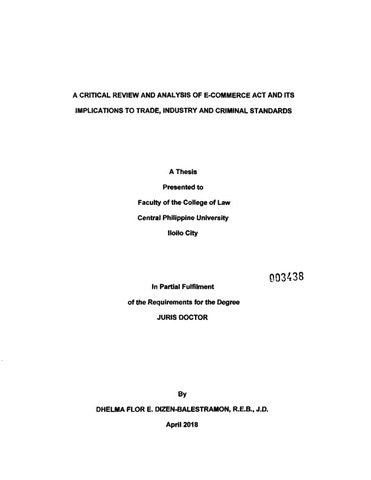A critical review and analysis of E-Commerce Act and its implications to trade, industry and criminal standards
Abstract
This study reviewed and analyzed R.A 8792 or the E-Commerce Act of 2000. Electronic Commerce is the exchange of information or transactions using any form of electronic communication. It facilitates convenient, fast and lower transaction costs both in commercial and non-commercial activities. However, critics were not persuaded by the positive impact of the law thus this study was contemplated to assess its effects in promoting trade and industry; to address the issues on reliability, privacy and security of users; and, to determine the offenses and liabilities embodied in the law that affect our criminal standards. Qualitative Data Analysis was the method used in this study where salient provisions from the law were identified as indicators of the study. The United Nations Commission on International Trade Law, the “Model Law” of R.A. 8792, the Implementing Rules and Regulations of the Act, and, printed and online references were used to support the researcher’s analysis. R.A. 8792, as the pioneering e-commerce law in the country, gave rise to laws governing electronic transactions. It mandated the creation of a government portal known as RPWeb to promote e-commerce. Today, public and private sectors are collaborating to enhance e-commerce and to fight cyber offenders.
Description
Abstract only
Suggested Citation
Dizen-Balestramon, D. F. E. (2018). A critical review and analysis of E-Commerce Act and its implications to trade, industry and criminal standards (Unpublished postgraduate thesis). Central Philippine University, Jaro, Iloilo City.
Type
ThesisSubject(s)
Keywords
Department
College of LawDegree
Juris DoctorShelf Location
Law Library 340.72 D648 2018
Physical Description
vi, 123 leaves
Collections
- Juris Doctor [144]
The following license files are associated with this item:



